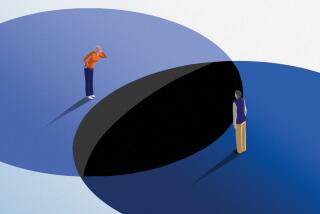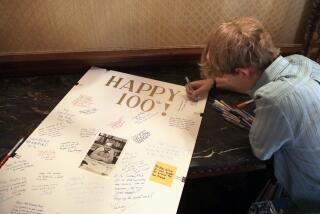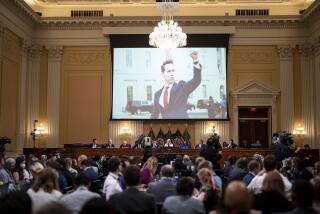Genius Unfettered : His Body Is Nearly Helpless, but Stephen Hawking’s Mind Is a Wondrous Thing
- Share via
BERKELEY — The wheelchair whirred through the restaurant’s double doors, tempting one diner to stare hard at its gnomish occupant. Unable to contain his curiosity, the young man stepped forward.
“Dr. Stephen Hawking?” he asked, his voice charged with something like awe. Hesitantly he reached out to shake a hand unable to accommodate such formalities. “I want you to know, you have a fan club in this restaurant.”
Hawking’s immobile right hand squeezed a gadget attached to a computerized voice synthesizer. From a speaker behind his seat, a robotic voice said: “Thank you.”
A waiter gestured, and Hawking’s chair careened forward. The sea of business people in the bustling bar parted, then went back to unwinding, apparently unaware that they had just glimpsed the man who may hold the key to the universe.
Scientists expect to live in cultural oblivion. What’s unexpected is for a theoretician-- especially one whom “Current Biography Yearbook” declares “the most brilliant theoretical physicist since Albert Einstein”--to emerge from the black hole of arcane research.
But Hawking’s devilish grin is already familiar to science buffs from his appearances on the PBS series “Nova,” and with his first non-technical book, “A Brief History of Time,” due in stores next week, Hawking’s star is likely to rise quickly on the popular culture horizon.
Posing Basic Questions
As the first few pages of his new book make clear, Hawking’s science is light years away from the rigid, foot-pounds to horsepower physics that high school teachers chisel into young heads.
Posing such basic questions as “where did the universe come from, and where is it going?” Hawking writes: “Only time (whatever that may be) will tell.” He further undermines cognitive smugness with his explanation of scientific theory, which “exists only in our minds, and does not have any other reality (whatever that might mean).”
Such rhetorical shoulder shrugs aren’t merely glib, though. For the last 20 years, Hawking has been waltzing about on the fringes of cosmology, quietly cooking up notions that challenge the nature of the universe as previously known.
A professor of mathematics at the University of Cambridge, in England, Hawking, 46, holds an academic chair occupied 300 years ago by Isaac Newton. To achieve that post--the most prestigious scientific position at Cambridge, Hawking has had to master not only the esoterics of relativity and quantum mechanics but tremendous physical obstacles as well.
In his undergraduate years at Oxford, Hawking was not a terribly hard-working student. Second-string coxswain for the university’s crew team, he could be persuaded to choose booze over books. But he was undeniably brilliant, and wound up studying relativity at Cambridge.
It was there that he began experiencing physical problems, which doctors eventually diagnosed as amyotrophic lateral sclerosis, a neurological disorder commonly known in America as Lou Gehrig’s Disease. Given only a few years to live, he grew despondent and drifted away from the Ph.D thesis on which he’d been working.
Gradually his muscles atrophied; he lost the ability to walk, to turn pages of a book, to hold a pencil, to feed himself. But two years after the diagnosis, Hawking realized that the condition had stabilized. Then he fell in love with a young undergraduate, Jane Wilde.
“In order to get married I had to get a job. And, in order to get a job, I needed to finish my thesis,” he said.
As a result, Hawking is married and has three children, and science has a bundle of new theories.
“My goal is simple,” Hawking once told Science magazine. “It is complete understanding of the universe, why it is as it is and why it exists at all.”
With that humble task in mind, Hawking has been working on the largest and smallest of scales, theorizing the existence of infinitely dense but dimensionless points in space-time known as singularities (which he later came to doubt); deducing mini-black holes, which emit particles (known as “Hawking radiation”); and now formulating a radical theory that the universe is without boundaries and has no temporal beginning or end.
What’s left for him to do is to fully concoct the coveted “unifying theory,” which will combine the seemingly contradictory general theory of relativity with quantum mechanics.
To do this, presumably, will take some monumental brainstorming, and Hawking’s colleagues have often marveled at his ability to solve complex equations in his head.
But Hawking downplays this. “I try to avoid problems with a lot of equations,” he said at a news conference at UC Berkeley this week. “People seem to equate mathematics with equations. Equations are the boring part of mathematics.”
The exciting part, for theoretical physicists, is concocting big ideas--making extremely well-educated leaps of intellectual faith, which must then be proven retroactively through complex formulations.
Most of the time, Hawking’s mind is filled with mundane thoughts, he said. The whopping revelations come “at odd moments. One cannot plan to have ideas.”
Lecture Crowds
Earlier, his lecture on “The Origin of the Universe”--in the university’s prestigious Hitchcock Lecture Series--drew a crowd that filled a 750-seat auditorium and spilled from a video overflow room seating another 500.
With woolly beards, renegade eyebrows and graying ponytails outnumbering Yup-cuts; thrift-store suits more common than Cal sweat shirts, the audience seemed heavily weighted toward the esoteric fringe of students and faculty, with a few crackpots, psychiatric outpatients and free-lance aficionados of the cosmos thrown in.
Pressing a small joy stick with his right hand, Hawking drove onto the stage in his wheelchair--a jerry-built contraption with batteries in wooden boxes, a lighted liquid crystal display at eye level and a maroon seat partially covered with sheepskin.
Warming up his audience like a sit-down comedian, he explained the voice synthesizer he uses. “The only trouble is that it gives me an American accent,” he deadpanned.
Then Hawking switched on a prerecorded computer file containing his talk, listening as his electronic voice carefully pieced together the history of humanity’s view of the universe--from early religious belief that it had a relatively recent and distinct genesis to Aristotelian denial of any cosmological beginning to Immanuel Kant’s argument that either view could be true.
Illustrated with cartoons and graphs that might earn a C at a high school science fair, shown on a dirty overhead projector by the Cambridge graduate student who accompanied him, Hawking led his audience past Newton and Einstein--both of whom “missed the chance of predicting that the universe should be either contracting or expanding”--to the “no boundary” theory that he and a colleague conceived. He explained it, in part, with a metaphor from the dismal science.
Universe Borrowed
”. . . The universe borrowed heavily from its gravitational energy to finance the creation of more matter. The result was a triumph for Reagan economics; a vigorous and expanding universe, filled with material objects. The debt of gravitational energy will not have to be repaid until the end of the universe.”
Coming full circle, Hawking left his attentive audience on a note of uncertainty: “Although science may solve the problem of how the universe began, it can not answer the question: Why does the universe bother to exist? Maybe only God can answer that.”
His book, which is subtitled “From the Big Bang to Black Holes,” concludes even more intriguingly. If he or other physicists do finally discover a unified theory of relativity, it should eventually be comprehensible--at least in broad outline--by everyone, he believes.
“Then we shall all, philosophers, scientists and just ordinary people, be able to take part in the discussion of the question of why it is that we and the universe exist. If we find the answer to that, it would be the ultimate triumph of human reason--for then we would know the mind of God.”
Hawking is a high priest of physics, one of a handful of theorists who may be on the verge of reading God’s mind. But while he dismisses his willingness to popularize with throw-away lines--”My aim is to get (“A Brief History of Time”) in airport book stalls,” he said at one point--his empathy for the intellectually handicapped is obvious in his book and in the way he patiently fields questions.
Conversation Laborious
One-on-one conversation is, for Hawking, a laborious process. Each word takes 10 or so clicks of his frail hand, and a one-sentence answer to a rambling question may take five minutes. Yet he’s too polite to create the repeatable one-click phrase: “That question is too stupid to answer.”
“It certainly makes me economical with words,” Hawking said of the procedure.
Eating is no picnic for Hawking, either, and his British staff of three nurses and graduate student Nick Phillips is every bit as reserved and reverential as one might expect.
To feed Hawking at the bay-side restaurant, a nurse stands behind him, clasping his forehead in one hand. Egged on by the others, nurse Pamela Benson attempted to feed him his sushi appetizer with chopsticks, causing even more food than usual to plop onto the bib he must wear.
Holding up a tiny slug that fell from the bouquet of flowers she had just picked from the restaurant’s garden, nurse Elaine Mason said, “Wouldn’t this make a lovely appetizer, Stephen?”
Later, nurse Teresa Crush baited Phillips, the grad student, with her analysis of theoretical physics: “It’s just men playing, isn’t it? And it’s just all make believe! There’s no proof for any of it anyway.”
The ongoing nuttiness keeps Hawking laughing so hard he can barely chew his dinner of rare prime rib.
The last ones out of the restaurant, the entourage spent a few minutes racing Hawking up the Berkeley pier. Then, as a vagrant shuffled between them playing “Shoo Fly” on a harmonica, Hawking’s giggling assistants hoisted the scientist back into the car. With the wheelchair in the trunk and two nurses sitting on top of each other in the back seat of the rental car, the somewhat unlikely group drove back through the time-warped Berkeley streets, past long-haired transients who looked as if they once sought the secrets of the cosmos--perhaps through chemical shortcuts--and wound up lost in space.
A Long Day
In all, it was a long day for Hawking, who will visit Southern California during his three-week lecture schedule at Berkeley. He had chatted and lectured and climbed lots of hills. At one point, he cheered up another ALS patient with a spinning wheelchair dance.
So when his assistants plopped him into his chair outside the Durant Hotel near the campus around midnight, it was little wonder that his batteries were literally dead.
Unable to speak electronically, he talked with his eyes and eyebrows and facial muscles, silently trying to make himself understood.
“He’s a real inspiration.” Mason whispered as the other three fiddled with Hawking’s chair. “He has to wait for everything . . . (But) he’s too intelligent to get cross; he knows it won’t change things.
“He has a lot of time to think,” she continued, watching the gentle struggle to make Hawking comfortable. “So he thinks for all of us.”
More to Read
Sign up for our Book Club newsletter
Get the latest news, events and more from the Los Angeles Times Book Club, and help us get L.A. reading and talking.
You may occasionally receive promotional content from the Los Angeles Times.










